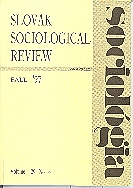Význam niektorých politických a ekonomických pojmov vo vzťahu k skúsenostiam dvoch generácií Slovákov a Maďarov
Meaning of Political and Economic Terms in Relation to Experience of Two Slovak and Hungarian Generation
Author(s): Jana Plichtová, Ferenc ErősSubject(s): Social Sciences
Published by: SAV - Slovenská akadémia vied - Sociologický ústav
Keywords: Political thinking; common people; Hungary; Slovakia; individualism-collectivism
Summary/Abstract: Three methods (1. Free associations to political terms, 2. The evaluation of the importance of the same terms with respect to the individual and/or to the community and 3. Questionnaire covering individual reflections of societal changes in the course of the past three years) were used to explore the commonalities and differences in political thinking of common people in the capital cities of Hungary and Slovakia. The sample was designed as a factorial plan 2 x 2 x 2 with three two-level factors (citizenship, generation, level of education). It was assumed that due to a longer period of liberalization, Hungarians rather than Slovaks already adopted a western type of democracy, especially individualism. In addition, individualism, as a generally accepted respect for the individual, was expected to be more widespread (1) among younger rather than older generation, (2) among higher educated rather than lower educated people. The opposite predictions were formulated with respect to communitarian values (e. g. fraternity, equality). More similarities than differences were identified between Slovak and Hungarian respondents in the consensual descriptions of the well-being of the individual and/or of the community. Hungarians did not adopt a western type of democracy and individualism to a greater extent than Slovaks. No differences in the acceptance of individualism was found between the young and the middle generation. Some data indicated just the opposite conclusion. However, higher support for individualism was found among the higher educated in comparison to the lower educated respondents. On the other hand, communitarian values were more supported by Hungarians than by Slovaks, more by lower educated than by higher educated respondents. No such differences were found with respect to two generations. Some unexpected differences were found in the meaning of the state and the democracy between Slovaks and Hungarians. While democracy was related predominantly to freedom by Slovaks, democracy in Hungarian understanding is connected more with justice and law and order. Democracy seemed to be more a important concept for Hungarian political thinking, while the state is in a similar position in Slovak political thinking. In addition, Slovaks and Hungarians conceptualize a division between the individual and the state distinctively. Findings were discussed with respect to the bipolar dimension 'individualism-collectivism' and/or complementary relationship between the individual and the community.
Journal: Sociológia - Slovak Sociological Review
- Issue Year: 1997
- Issue No: 6
- Page Range: 723-737
- Page Count: 15
- Language: English

